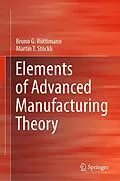Autorentext
B. Rüttimann:
- Dr.-Ing. Milan Polytechnic Institute
- MBA Bocconi University
- 20 years managerial experience (Alusuisse, Alcan, Rio Tinto)
- since 2010 consulting (inspire AG)
- since 2010 lecturing (ETH Zürich)
M. Stöckli
- Dr. sc. techn. ETH Zürich
- Dipl. Masch.-Ing. ETH Zürich
- NDS BWI, ETH Zürich>20 years managerial experience in the automotive industry (Delphi Automotive Systems, IVECO, Schaffner, DUAP)
- since 2009 head of inspire Academy (inspire AG)
- since 2008 COO of inspire AGInhalt
Foreword by Prof. K. Wegener
Prologue
1. Introduction
Reflections on Present Production Science Didactics:
The Missing of a Cartesian-based Manufacturing Theory (in preparation)
2. Basic Classification of Production Systems
From Batch & Queue to Industry 4.0-Type Manufacturing Systems:
A Taxonomy of Alternative Production Models (18 Seiten)
3. The Central Importance of the Bottleneck
Discourse about Linear Programming and Lean Manufacturing:
Two Different Approaches with a Similar Converging Rational (7 Seiten)
4. Elasticity, Lead-Time, On-Time Delivery
Exploiting Virtual Elasticity of Production Systems for Respecting OTD - Part 1:
Post-Optimality Conditions for Ergodic Order Arrivals in Fixed Capacity Regimes (22 Seiten)
5. Understanding the Advantage of Lean Pull JIT Versus Push B&Q
Exploiting Virtual Elasticity of Manufacturing Systems to Respect OTD - Part 2:
Post-Optimality Conditions for the Cases of Ergodic and Non-ergodic Order Rate with Deterministic Product-Mix (25 Seiten)
6. Flexibility and the One-off Product Challenge of CPPS
Exploiting Virtual Elasticity of Production Systems to Respect OTD - Part 3:
Modelling CPPS Characterized by Non-ergodic Order Entry and Non-deterministic Product-mix for Fully Flexible Addressable Workstations (in preparation)
7. Some Critical Considerations About Industry 4.0
Lean and Industry 4.0 - Twins, Partners, or Contenders?
A Due Clarification Regarding the Supposed Clash of Two Production Systems (16 Seiten)
Epilogue
